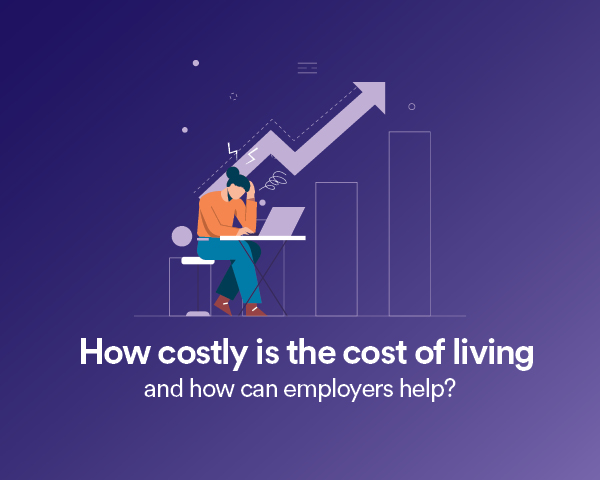How costly is the cost of living and how can employer’s help?

Women in Fintech – Jo Gibson
April 11, 2023
Women in Fintech – Amanda Sadler
May 22, 2023
A frequently discussed topic in the last year has understandably been the cost-of-living crisis. We have seen the cost of living in the UK steadily increasing over the past years and seemingly outpacing the rate of wage growth, making it harder for people to maintain their standard of living.
As a collection of increasing costs, cutting back has been important for people. However, it is not talked about enough in the context of mental health. As a result of the cost-of-living crisis, according to a survey, 49% of therapists have seen their clients cut back on activities that benefit their mental health. 60% of therapists have seen clients cutting back on therapy sessions due to money worries and 47% of therapists have seen clients cancelling sessions because people can no longer afford them.
According to BACP, 2/3 of therapists say the cost of living is causing a decline in people’s mental health. With an increase in the need of mental health services required and fewer able to afford it, it shows the level of crisis this cost-of-living increase has created.
So, what can employers do to help?
It may not be possible for many companies to offer pay rises that can keep pace with current rates of inflation, but there are many other benefits employers can offer to help reduce financial stress. The upshot is that staff will feel supported, which will likely increase both their loyalty and productivity.
- Subsidised or free food and drink
As we know, food costs have increased rapidly, so this small gesture can go a long way when it comes to helping employees.
- Salary sacrifice schemes
This allows the cost of the scheme to be deducted at source for a PAYE employee, which avoids income tax being applied on the sacrificed amount. This can be put towards gym memberships, car parking, childcare vouchers, equipment etc.
- Season ticket loans
This will help employees to spread the cost of their travel if they take public transport, which again, can go a long way not having to pay one lump sum on a season ticket.
- Offering hybrid work options
46% workers reported spending less directly, whilst 40% spent less money commuting to work via public transport. Showing this can be an effective method in supporting employees in saving money.
- Discounted employee benefits
This can benefit employees in saving costs for a number of things such as transport, gym memberships, experiences, and shopping vouchers. Again, this will help in areas where employees are making cuts due to the cost of living and can help make a positive impact on mental health.
- Selling back unused holidays
This would be a direct method for employees to have more money in their pocket which can definitely help with the cost of living. On the other side, an employer should also consider buying holidays which can help from a mental health perspective. Giving the option is the best method.
- Pay rise
This is the more obvious black and white answer, though one that addresses the issue directly. If an employer is able to do this, this would be the greatest help to employees. As an employer, you would need to consider the size of the team, industry your business is in and the businesses financial health to see if this is a viable option.
In conclusion, whilst employers can’t match the skyrocketing inflation, there are so many alternative ways to help employees through these tough times. The overall impact is better mental health, better quality of life and higher levels of employee satisfaction.
For more information and support email kprince@crsltd.info
